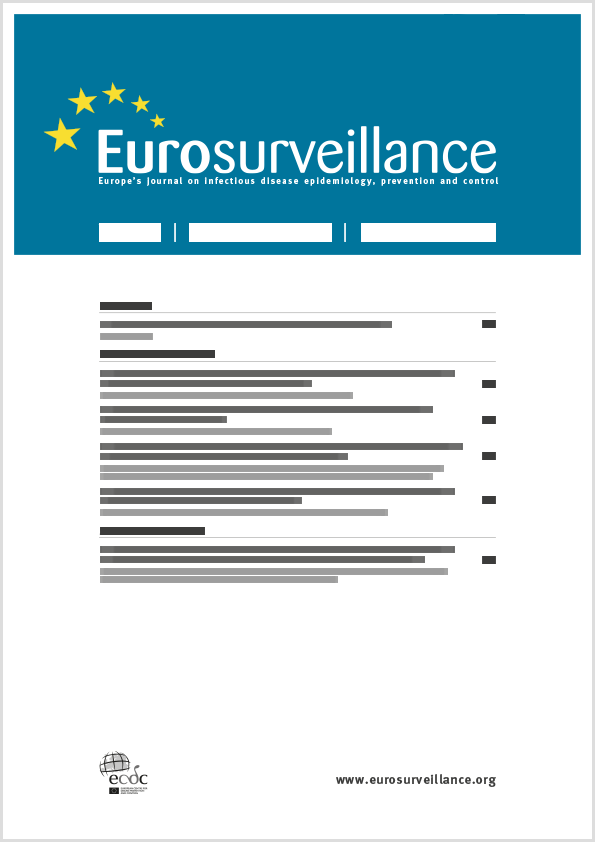- Home
- Eurosurveillance
- Previous Issues
- Volume 19, Issue 29, 24/Jul/2014
Eurosurveillance - Volume 19, Issue 29, 24 July 2014
Volume 19, Issue 29, 2014
- Rapid communications
-
-
-
Case of Legionnaires’ disease in a neonate following a home birth in a heated birthing pool, England, June 2014
More LessPublic Health England was notified of Legionnaires' disease in a neonate following a home birth in a heated birthing pool filled from the domestic hot water supply two weeks earlier. We describe the incident, sampling results, and public health actions. It is recommended that heated birthing pools should not be used for home births. Neonates developing pneumonia within 14 days of labour or birth in any birthing pool should be tested for Legionnaires' disease. .
-
- Top
-
- Research articles
-
-
-
Characterisation of a new group of Francisella tularensis subsp. holarctica in Switzerland with altered antimicrobial susceptibilities, 1996 to 2013
F C Origgi , J Frey and P PiloMore LessMolecular analysis of Francisella tularensis subsp. holarctica isolates from humans and animals revealed the presence of two subgroups belonging to the phylogenetic groups B.FTNF002-00 and B.13 in Switzerland. This finding suggests a broader spread of this group in Europe than previously reported. Until recently, only strains belonging to the Western European cluster (group B.FTNF002-00) had been isolated from tularaemia cases in Switzerland. The endemic strains belonging to group B.FTNF002-00 are sensitive to erythromycin, in contrast to the strains of the newly detected group B.13 that are resistant to this antibiotic. All the strains tested were susceptible to ciprofloxacin, streptomycin, gentamicin, nalidixic acid and chloramphenicol but showed reduced susceptibility to tetracycline when tested in a growth medium supplemented with divalent cations. The data show a previously undetected spread of group B.13 westwards in Europe, associated with changes in the antibiotic resistance profile relevant to treatment of tularaemia.
-
- Top
-
- Surveillance and outbreak reports
-
-
-
Surveillance for outbreaks of gastroenteritis in elderly long-term care facilities in France, November 2010 to May 2012
A S Barret , N Jourdan-da Silva , K Ambert-Balay , G Delmas , A Bone , J M Thiolet and V VaillantMore LessThis article describes outbreaks of gastroenteritis in elderly long-term care facilities (LTCF) in France from November 2010 to May 2012 reported through the surveillance system for gastroenteritis outbreaks in LTCF. A total of 1,072 outbreaks were reported, causing 26,551 episodes of illness and 60 deaths. The median attack rate (AR) among residents was 32%. Norovirus and person-to-person transmission were the most frequently reported aetiology and mode of transmission. Control measures were implemented in 1,054 (98%) outbreaks and for 928 outbreaks, the timing of such measures could be inferred. Of these, 799 (86%) had put control measures into effect within three days of the occurrence of the first case. Outbreaks of gastroenteritis in LTCF cause substantial morbidity and mortality among elderly people in France. LTCF are encouraged to develop infection prevention and control plans and to notify any gastroenteritis outbreak to health authorities to ensure rapid control.
-
- Top
-
- Review articles
-
-
-
Systematic literature analysis and review of targeted preventive measures to limit healthcare-associated infections by meticillin-resistant Staphylococcus aureus
R Köck , K Becker , B Cookson , J E van Gemert-Pijnen , S Harbarth , J Kluytmans , M Mielke , G Peters , R L Skov , M J Struelens , E Tacconelli , W Witte and A W FriedrichMore LessMeticillin-resistant Staphylococcus aureus (MRSA) is a major cause of healthcare-associated infections in Europe. Many examples have demonstrated that the spread of MRSA within healthcare settings can be reduced by targeted infection control measures. The aim of this systematic literature analysis and review was to summarise the evidence for the use of bacterial cultures for active surveillance the benefit of rapid screening tests, as well as the use of decolonisation therapies and different types of isolation measures. We included 83 studies published between 2000 and 2012. Although the studies reported good evidence supporting the role of active surveillance followed by decolonisation therapy, the effectiveness of single-room isolation was mostly shown in non-controlled studies, which should inspire further research regarding this issue. Overall, this review highlighted that when planning the implementation of preventive interventions, there is a need to consider the prevalence of MRSA, the incidence of infections, the competing effect of standard control measures (e.g. hand hygiene) and the likelihood of transmission in the respective settings of implementation.
-
- Top
-
- Miscellaneous
-
Volumes & issues
-
Volume 30 (2025)
-
Volume 29 (2024)
-
Volume 28 (2023)
-
Volume 27 (2022)
-
Volume 26 (2021)
-
Volume 25 (2020)
-
Volume 24 (2019)
-
Volume 23 (2018)
-
Volume 22 (2017)
-
Volume 21 (2016)
-
Volume 20 (2015)
-
Volume 19 (2014)
-
Volume 18 (2013)
-
Volume 17 (2012)
-
Volume 16 (2011)
-
Volume 15 (2010)
-
Volume 14 (2009)
-
Volume 13 (2008)
-
Volume 12 (2007)
-
Volume 11 (2006)
-
Volume 10 (2005)
-
Volume 9 (2004)
-
Volume 8 (2003)
-
Volume 7 (2002)
-
Volume 6 (2001)
-
Volume 5 (2000)
-
Volume 4 (1999)
-
Volume 3 (1998)
-
Volume 2 (1997)
-
Volume 1 (1996)
-
Volume 0 (1995)
Most Read This Month

-
-
Detection of 2019 novel coronavirus (2019-nCoV) by real-time RT-PCR
Victor M Corman , Olfert Landt , Marco Kaiser , Richard Molenkamp , Adam Meijer , Daniel KW Chu , Tobias Bleicker , Sebastian Brünink , Julia Schneider , Marie Luisa Schmidt , Daphne GJC Mulders , Bart L Haagmans , Bas van der Veer , Sharon van den Brink , Lisa Wijsman , Gabriel Goderski , Jean-Louis Romette , Joanna Ellis , Maria Zambon , Malik Peiris , Herman Goossens , Chantal Reusken , Marion PG Koopmans and Christian Drosten
-
- More Less


